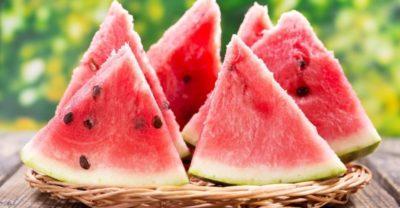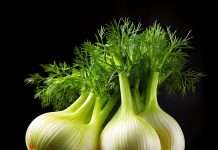
Watermelon is a large edible berry fruit with a solid rind and without internal divisions. The sweet, juicy flesh is usually deep red to pink, with many black seeds, although seedless varieties exist. The fruit can be eaten raw or pickled, and the rind is edible after cooking. It may also be drunk as a juice or an ingredient in mixed beverages.
Studies have affirmed watermelon to be among the most powerful, body-healing fruits out there. The surprising health benefits of watermelon cover everything from your brain all the way to the cells in your feet.
The best time to indulge in this fresh, succulent, juicy melon is summertime when they are in season and deliver an array of nutrients, vitamins, and minerals.
Watermelon is incredibly hydrating (up to 92% water!) and is naturally low-fat. Make this melon a part of your daily diet and you will reap surprising benefits that range from improving cardiovascular health to nourishing your eyes and revving up your immune system.
A recent study published in the journal of Environmental Research and Public Health, conducted by Adda Bjarnadottir, revealed that watermelon is one of the best dietary sources for both citrulline and lycopene, two powerful plant compounds.
This juicy melon may have several health benefits, including lower blood pressure, improved insulin sensitivity, and reduced muscle soreness.
The research further stated that watermelon is another source of vitamin C and a decent source of several other vitamins and minerals. Its abundant antioxidant is essential for skin health and immune functions.
6 Health Benefits of Watermelon
- Reduces Body Fat: The citrulline in watermelon has proven to reduce the accumulation of fat in our fat cells. Citrulline is an amino acid that converts into arginine with help from the kidneys. When our bodies absorb citrulline it can take the step of converting into arginine if so required. Citrulline, when consumed, can (through a series of steps) block the activity of TNAP (tissue-nonspecific alkaline phosphatase) which makes our fat cells create less fat, and thus helps prevent over-accumulation of body fat.
- Anti-inflammatory & Antioxidant Maintainance: Watermelon is rich in phenolic compounds like flavonoids, carotenoids, and triterpenoids. The carotenoid lycopene in watermelon is particularly beneficial in reducing inflammation and neutralizing free radicals. The terpenoid cucurbitacin E is also present in watermelon, which provides anti-inflammatory assistance by blocking the activity of cyclo-oxygenase enzymes which normally results to increase inflammatory assistance.
- Diuretic & Kidney Functions: Watermelon is a natural diuretic that helps increase the flow of urine, but does not strain the kidneys (unlike alcohol and caffeine). Watermelons help the liver process ammonia (waste from protein digestion) which eases the strain on the kidneys while getting rid of excess fluids.
- Muscle & Nerve Maintainance: Rich in potassium, watermelon is a natural electrolyte and thus helps regulate the action of nerves and muscles in our body. Potassium determines the degree and frequency with which our muscles contract, and controls the excitation of nerves in our body.
- Improves Eye Health: Watermelon is a wonderful source of beta-carotene (that rich red hue of watermelon = beta-carotene) which is converted in the body to vitamin A. It helps produce the pigments in the retina of the eye and protects against age-related macular degeneration as well as prevents night blindness. Vitamin A also maintains healthy skin, teeth, skeletal and soft tissue, and mucus membranes.
- Immune boosting: The vitamin C content in watermelon is astoundingly high. Vitamin C is great at improving our immune system by maintaining the redox integrity of cells and thereby protecting them from reactive oxygen species (which damages our cells and DNA). The role of vitamin C in healing wounds is also noticed in numerous studies because it is essential to the formation of recent linking tissue. The enzymes involved in forming collagen (the main component of wound healing) cannot function without vitamin C. If you are suffering from any slow-healing wounds, up your intake of vitamin C-heavy fruit.











